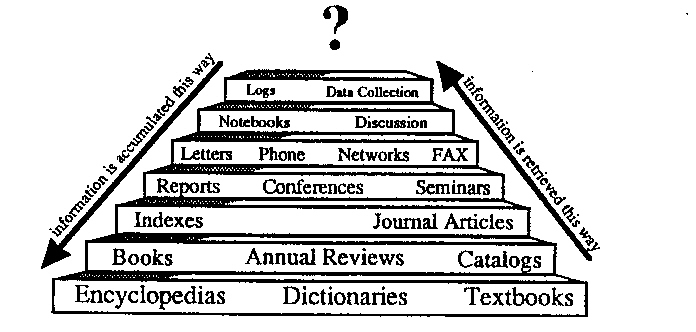
Curso doctorado Metodología Filosófica
Prof. Jaime Nubiola
Universidad de Navarra
En la Biblioteca de la Universidad de Glasgow tenían hace unos pocos años el siguiente documento para enseñar a los estudiantes a manejarse entre las montañas de libros que alberga. Me pareció muy ilustrativa la descripción de cómo se produce el conocimiento y cómo un nuevo investigador puede adentrarse en él. Merece una detenida lectura el texto y sobre todo vale la pena prestar atención a la imagen de la pirámide.
El texto era el siguiente:
Each subject you study will be based on a literature -a set of publications including textbooks, monographs, and scholarly journals. You will use these vital sources in order to learn more about that subject, thus joining the conversation, first as an observer, and later as a contributor to your chosen field of study.
The publication cycle and the structure of information
Research is a social act. As a routine part of their work, experts doing research communicate with each other and with several other audiences -the people who fund the work, students who are learning the subject, or the general public. Knowing the formal communication process experts use will help you make sense of the information around you. The diagram below illustrates how important ideas are developed, how they are communicated, and how they are integrated into general knowledge.
At the beginning is a question, a problem, a puzzle. The researcher observes, collects data, conducts surveys, or keeps notebooks and logs in order to learn about the question; letters, phone calls, computer networks enable more colleagues to become involved. As ideas take shape, communication becomes more structured; researchers write reports and attend seminars or conferences to share information. A journal article, the first step in the formal information record, is approved by colleagues and published. Indexes to the journals disseminate the idea; soon monographs or books contain the topic. Eventually, dictionaries, encyclopedias, and textbooks include this material, thereby communicating knowledge to the next generation of scholars.
______
The research strategy
The logical way to learn about a new subject in order to successfully complete a major project is to simply reverse the direction of the development process shown above. Begin with background information -overviews or summaries usually found in dictionaries, encyclopedias, textbooks. Learning the vocabulary, history, current issues, and experts helps you understand the subject and furnishes clues for further exploration. Follow this backgrounding by reading books/monographs that combine subject context with detail. Last, select indexes to the periodical literature to locate the articles that provide even more specific detail and more current analyses.
___________________![]()
This research process -general to specific- is a time-tested strategy. It is a way of organizing your efforts in order to get maximum benefit from your hard work.
UGL Guide: http://www.lib.gla.ac.uk/
Diseño de la página: Izaskun Martínez
Ultima actualización: 6 de abril 2011